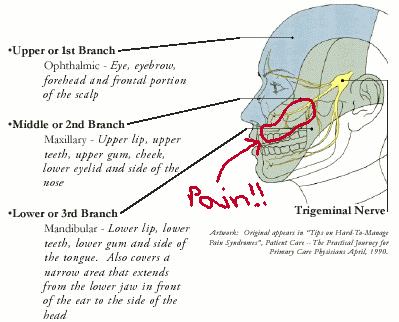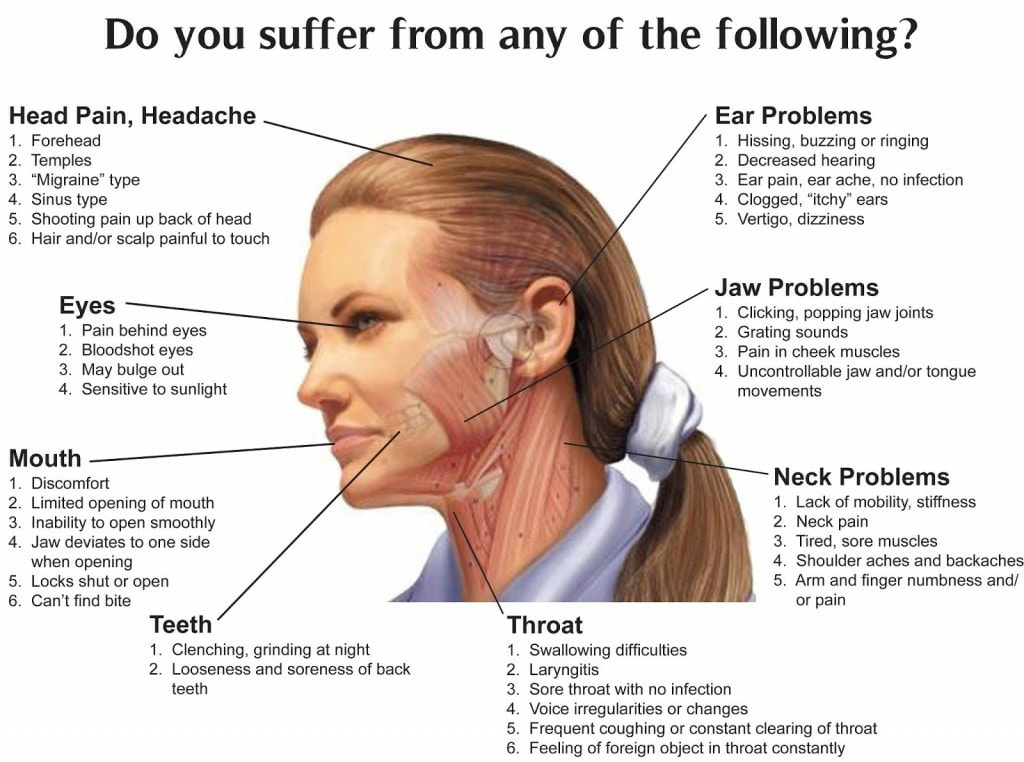Risk of untreated Bruxism (Teeth Grinding) for brass players. Bruxism, also known as teeth grinding, is known to affect over 40 million Americans and can have adverse effects for brass players such as lack of endurance, decreased range, muscle weakness, impaired articulation, flexibility issues, facial pain, hearing problems, migraine headaches and anxiety. Brass players may experience difficulty playing due to nerve and or muscle pain. These issues are commonly referred to by Doctors as orofacial problems which include craniomandibular dysfunctions (CMD), often called temporomandibular disorders (TMD). According to Oxford Academic, orofacial symptoms can be caused or exacerbated by grinding your teeth - bruxism. This article will address the basic symptoms of bruxism, tips for diagnosis, how to seek treatment. Also included is a video from 2 physical therapists which describes how to self massage the facial muscles and relieve the symptoms associated with TMD. Symptoms: The symptoms of bruxism can include: lack of endurance, decrease in range, facial pain, muscle weakness and fatigue especially in the muscles associated with the embouchure. If untreated, pain can worsen after playing and cause a variety of symptoms. Middle ear pressure changes affecting how you hear yourself According to Fletcher, NH Tarnopolsky, Bruxism (also known as teeth grinding) can also adversely effect the pressure in the middle ear which can affect the how you hear the sound coming out of your instrument and cause you to over blow. Over blowing can then lead to embouchure changes and how you shape your throat and mouth cavity when you play. If you have ever tried to play your instrument with a head cold, then you would have experienced some of the difficulties associated with pressure changes in your middle ear. Difficultly hearing can adversely effect how we articulate notes cleanly and tongue placement. Over blowing can lead to playing with too much pressure which can cause additional teeth pain and increased pain in the mandibular and maxillary areas of the face associated with the temporomandibular joint. The adverse effects of bruxism may develop slowly over time and the brass player may not be aware of the cause of his or symptoms. Long Term effects: The psychological effects of performing with facial pain can lead to anxiety, lack of confidence and undue stress which further exacerbates the condition. According to Dr. Ressman, the relationship between bruxism and CMD (craniomandibular dysfunctions) with stress is well known. According to Schü B Kanzlivius, Peroz, evidence also supports a correlation between anxiety/stage fright with orofacial pain. Stressful life events can also increase the severity of bruxism (teeth grinding). Death in the family, financial difficulty and relationship issues also increase the severity and intensity of teeth grinding. Bruxism often occurs subconsciously which means we are not aware we are grinding our teeth. These subconscious anxiety responses can manifest while we sleep and dream which can cause more pronounced teeth grinding. According to NCBI, sleep bruxism was reported by 8.6 % of the population. Sleep bruxism can cause muscle fatigue upon awakening and long before we play a note in the instrument. This would result in decreased endurance and difficulty performing because of increased anxiety about one’s ability to play. Another obvious symptom is damage to your teeth. How do you know if you have Bruxism? The most accurate way to diagnose Bruxism is to see your dentist. The dentist can look at the wear of your teeth and determine if you have bruxism. Below is a chart which indicates the physical symptoms of Bruxism.  Bruxism treatment:
The most popular treatment for Bruxism is a custom made mouth guard created by a Dentist – DMD or DDS. This typically resolves symptoms in 70% of those diagnosed with Bruxism. Obtaining a mouth guard is painless and easy. The dentist creates an impression of your teeth by placing an clay like non toxic semi-solid material in dental impression tray which is designed to roughly fit over the dental arches. You then bite down on the tray and the material sets to become an elastic solid (usually takes a few minutes depending upon the material), leaving an imprint of person's dentition and surrounding structures of oral cavity. You are then directed by the dentist when and how to wear the impression over your teeth, often times before going to sleep. Another way to self treat bruxism is by massaging the pressure points. Below is a link to a Youtube video of two physical therapists that explain how to alleviate facial pain. https://youtu.be/7b73yE0U2t0 Conclusion. Bruxism is an issue to take seriously and should be evaluated by a dentist. Treatment is usually not difficult or expensive and can be managed by a mouth guard from your dentist along with basic massage techniques. The benefits of treatment include significantly decreasing the harmful effects of teeth grinding, preserving existing teeth structure, keeping the teeth from cracking or wearing down, and prevention of further craniomandibular and temporomandibular disorders. Sources: Oxford Academic, Symptoms of craniomandibular dysfunction in professional orchestra musicians A. Steinmetz A. Zeh K. S. Delank I. Peroz Sleep. 2016 Nov 1; 39(11): 2049–2056. Published online 2016 Nov 1. doi:10.5665/sleep.6242 https://www.ncbi.nlm.nih.gov/pmc/articles/PMC5070759/ Khoury S, Carra MC, Huynh N, Montplaisir J, Lavigne GJ. Sleep bruxism-tooth grinding prevalence, characteristics and familial aggregation: a large cross-sectional survey and polysomnographic validation. SLEEP 2016;39(11):2049–2056. Reissmann DR John, MT Schierz O Seedorf H Doering S. Stress-related adaptive versus maladaptive coping and temporomandibular disorder pain J Orofac Pain 2012; 26: 181 -190. Schü B Kanzlivius, Peroz, Stress, coping, and craniomandibular disorders. Schmerz 2006; 20: 490 –497. Disclaimer: This is blog entry is not for the purpose of diagnosis or treatment of a medical condition. Please consult your Dentist or physician to determine if you have any of the symptoms listed above. |
Archives
April 2020
Mark ZaussTrumpet player, Licensed clinical psychotherapist. Categories
All
|